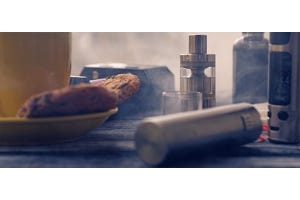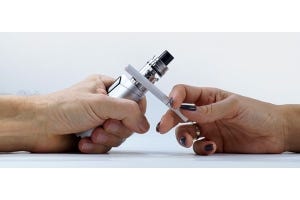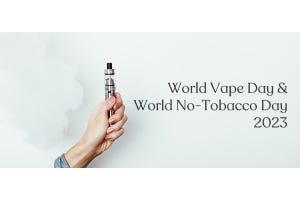Call For "Shake And Vape" Products Crackdown

BOSSES of leading vape companies have called for an urgent worldwide crackdown on “shake and vape” fluids found on the internet.
Following an investigation in Britain’s The Times newspaper this week which discovered e-cigarette products resembling sweet treats and containing potentially dangerous chemicals are being sold on Amazon, industry figures are again urging the UK government to take action.
“Shake and vape” fluids currently escape rules for tobacco and e-cigarette products because they contain no nicotine themselves.
Instead, the bottles that are marketed to mimic fizzy drinks, candy or cakes, are designed for customers to mix with a $1 shot of nicotine before vaping it in an e-cigarette.
The UK Vaping Industry Association, (UKVIA) which helps support the vape industry, has said it has conducted its own tests on “shake and vape” products and found “worrying levels” of chemical Acetyl propionyl that would otherwise be banned in a nicotine containing liquid.
The group has also highlighted how these online sellers - who are also using the “loophole” to escape strict industry regulations that disallows e-cigarette packaging to resemble foods and sweet treats - is not only putting public safety at risk but undermining the hard work of vape manufacturers who provide high-quality and safe vape products for its customers.
During The Times investigation, journalists found a number of items for sale, including bottles of 0-nicotine liquids that looked like Fanta and Krispy Kreme doughnuts.
One verified reviewer said of an orange 50ml Fantasi product, which costs £12.51: “Little brother drank it, complained it didn’t taste like Fanta.”
Other products on offer which used rip-off packaging of big-name brands included Donut King – which mimicked Krispy Crème donuts, Vape Cola, which copies the Coca-Cola branding and Wrigley's chewing gum.
UKVIA said in a statement of the "shake and vape" products currently available online: “This situation is a classic example of poorly thought through regulation and the law of unintended consequences. We have raised this issue with government, regulators and Parliament on a number of occasions – and so far our concerns have fallen on deaf ears.
“Our members are focused on providing best in class products, that have consumer enjoyment and safety at their core. To be clear we are only concerned about a minority of products. However, elements of the industry are exploiting this ‘loophole’ and are thereby undermining the hard work of responsible manufacturers.
“This situation is being perpetuated by irresponsible marketing utilizing platforms such as Amazon. Consumers, understandably, cannot be expected to know the exact components of the liquids that they are purchasing. A lack of due diligence by prominent online retailers, like Amazon, is allowing the market to be flooded with potentially dubious unregulated liquids.
“What’s more, 0-nicotine liquids are not subject to the same advertising and marketing standards. We are deeply concerned that a number of products are ignoring copyright and utilizing marketing methods that most reasonable people would regard as irresponsible.”
Amazon declined to comment and according to The Times newspaper by Friday evening had not removed any of the products from sale.
Leading food manufacturers, meanwhile, including Coca-Cola, and Mars Wrigley Confectionery, said they took all possible measures to protect consumers from copycat branding.
The UK's Department of Health and Social Care also reportedly confirmed to the paper that there were no plans for any changes in regulations affecting short-fill products.
John Dunne, a director of UKVIA, said: “These products are often manufactured in the Far East and are flooding the market. They could present a potential danger to consumers. They are a blatant rip-off of brands and there is a lack of diligence by online retailers like Amazon. It’s irresponsible . . . some are clearly marketed towards a younger audience.”
UKVIA has vowed to continue urging governments to take action to prevent a “potential public health issue” and “ensure vaping remains a viable alternative for those seeking to reduce or stop smoking”.
Photo: The Sunday Times













